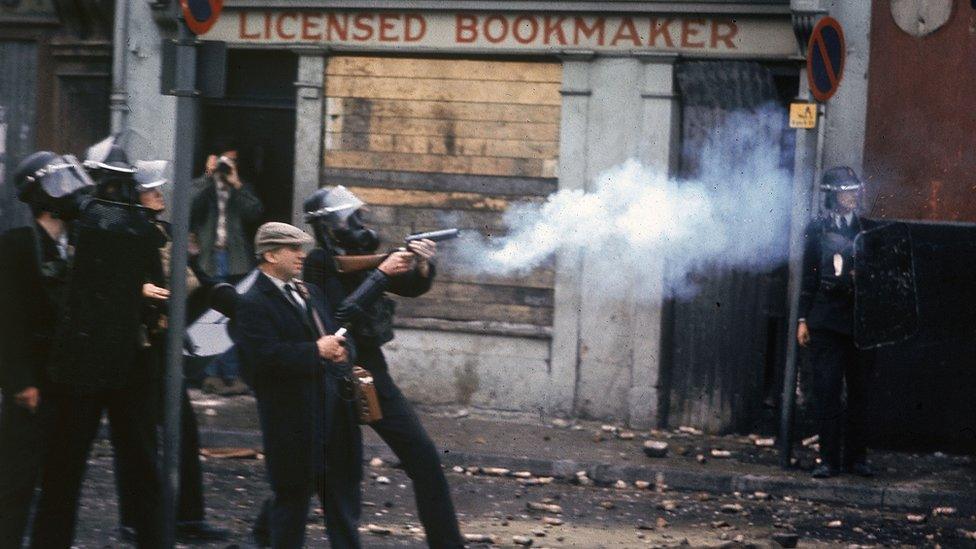Victor Fagg: The man who helped form the Provisional IRA
- Published
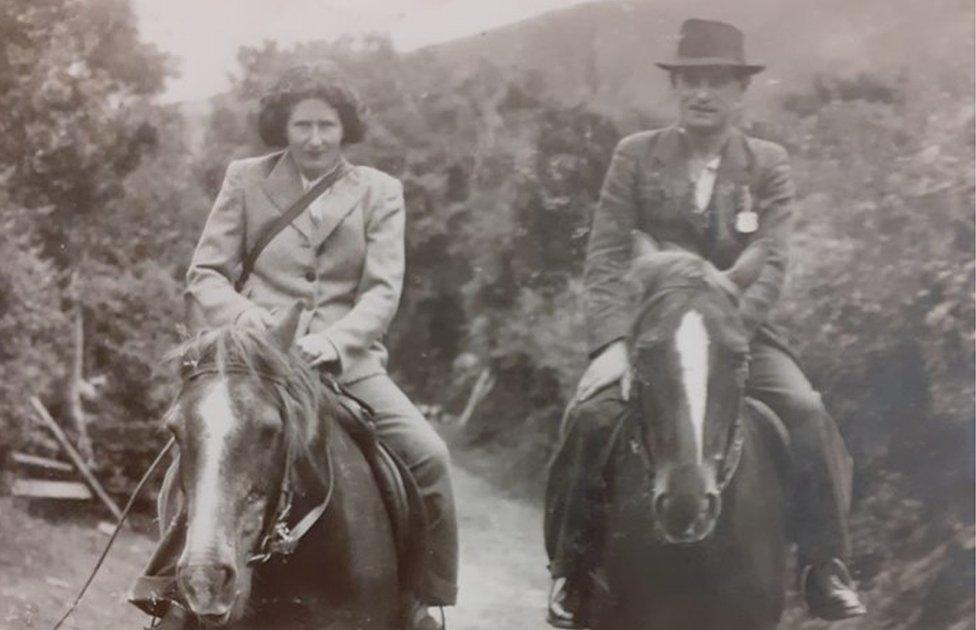
The late Victor Fagg, who hosted the Provisional IRA's first meeting, pictured with his wife Una
He was the Protestant-born son of an English sailor and an unlikely member of Northern Ireland's most infamous republican paramilitary group.
On 23 December 1969, Victor Fagg invited a group of Irish republicans to his home in Athlone, County Westmeath, where they founded the Provisional IRA.
Details of the meeting were revealed in the first instalment of a major BBC series on the history of the Troubles.
It came as a shock to Mr Fagg's family, according to his grandson, Morgan Fagg.
"To say it was news to us is an understatement," he wrote in an article published by the Irish Times, external.
"Northern Ireland's religious war has always confused me.
"I knew my grandfather was originally from a Protestant household and his conversion to republicanism was never fully explained."
'Conflicted'
The Provisional IRA (PIRA) waged a long and violent campaign from 1969 to 1996 in a bid to end British rule in Northern Ireland.
Morgan Fagg was only seven years of age when his grandfather died and although he knew the pensioner was a "republican," he had no idea about his early role in the PIRA.
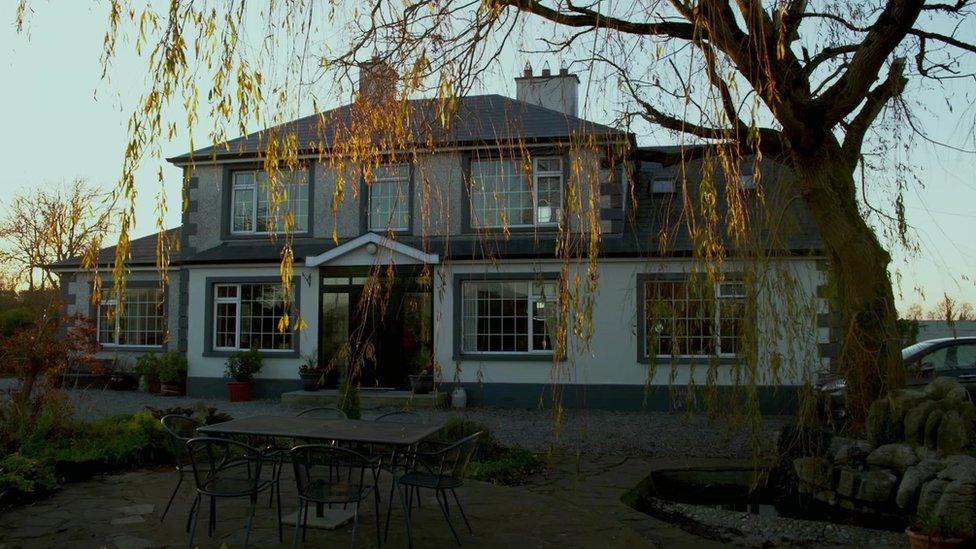
Victor Fagg's farmhouse outside Athlone hosted PIRA's first ever meeting 50 years ago
The revelation came "out of the blue" when the BBC Spotlight team contacted his parents' home outside Athlone a few months ago.
"I know for them it was a big surprise as well to hear about this historical meeting, this footnote in history that hasn't been spoken about for five decades," Morgan Fagg told BBC News NI.
The Provisional IRA is thought to be responsible for more than 1,700 killings, external - almost half of the entire Troubles death toll.
Its victims included British soldiers, police and prison officers as well as hundreds of civilians.
Morgan Fagg described himself as a "pacifist" and admitted he is "very conflicted" about his grandfather's role in the paramilitary group.
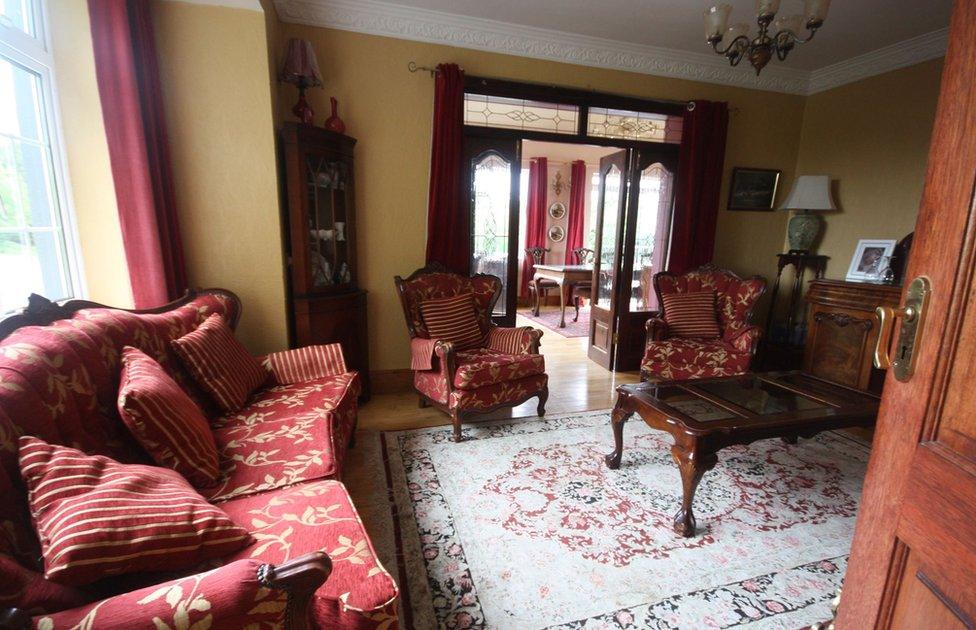
The decor of the Athlone living room where PIRA was formed has been updated since 1969
"I couldn't condone bombing campaigns in particular, or attacks on civilians, but conflict is conflict and Ireland has certainly seen enough of it." he said.
"I've been fortunate enough to grow up during 20 years of peace."
The 38-year-old English language teacher now lives in Spain and has no personal involvement with republicanism.
Now that his family secret is out, however, he has been trying to find out more about his grandfather's role in a significant turning point in Irish history.
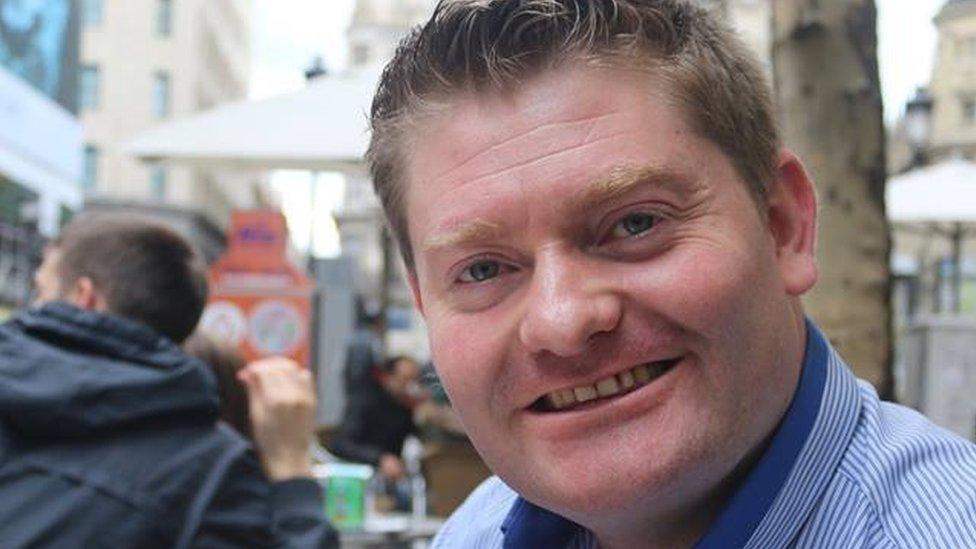
Madrid resident Morgan Fagg said he is a pacifist who believes armed conflict "is not the answer"
Victor Fagg was born into a Protestant family in County Mayo, 15 years before the partition of Ireland.
His father, John Fagg, was a Royal Navy sailor from England, possibly Kent, who served on British ships including the HMS Gannet.
He later moved to Ireland where he got a job with the coast guard - Victor was born at Blacksod Bay Coast Guard Station in 1906.
The family later moved to Athlone, County Westmeath, where, at the age of 14, Victor witnessed something that might explain his "conversion to republicanism".
'Talk or die'
On 20 June 1921, during the Irish War of Independence, IRA gunmen tried to kidnap a senior British Army officer near his family home.
Brigadier General Thomas Stanton Lambert was travelling in a car with another officer, and both their wives, when the gang ambushed them and opened fire.
Brig Gen Lambert, a decorated World War One veteran, was fatally wounded and died in hospital later that night.
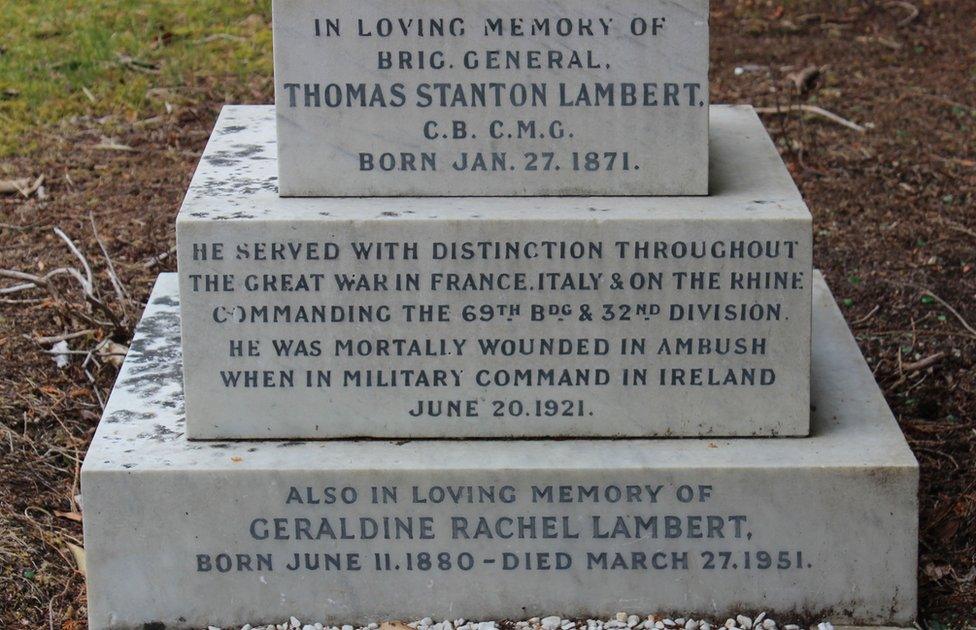
Brig Gen Thomas Stanton Lambert was a WW1 veteran and was mentioned in Despatches five times
Victor Fagg was not part of the ambush but reportedly saw the officers' vehicle leaving the scene.
The teenager witness was interrogated at gunpoint by British troops, according to his grandson.
"He was questioned and the British soldiers levelled rifles at his head," explained Morgan.
"He was pretty much given the choice of talk or die."
The troops took revenge on the local population, burning a number of families out their homes.
It is not clear how soon after this incident Victor joined the IRA - he may have been too young to play a part in the Irish Civil War (1922-23), when republicans split over the treaty that partitioned Ireland.
By 1924, though still in his late teens, he formed a "guard of honour" when the bodies of 20 anti-treaty republicans executed by the new Irish state were handed over to their families.
In 1938, he became a member of the IRA's "executive council" and, during the Second World War, he was among republicans imprisoned without trial by Irish authorities.
Victor Fagg then converted to Catholicism in 1943 to marry Una Daly, who was a member of the women's IRA group, Cumann na mBan.
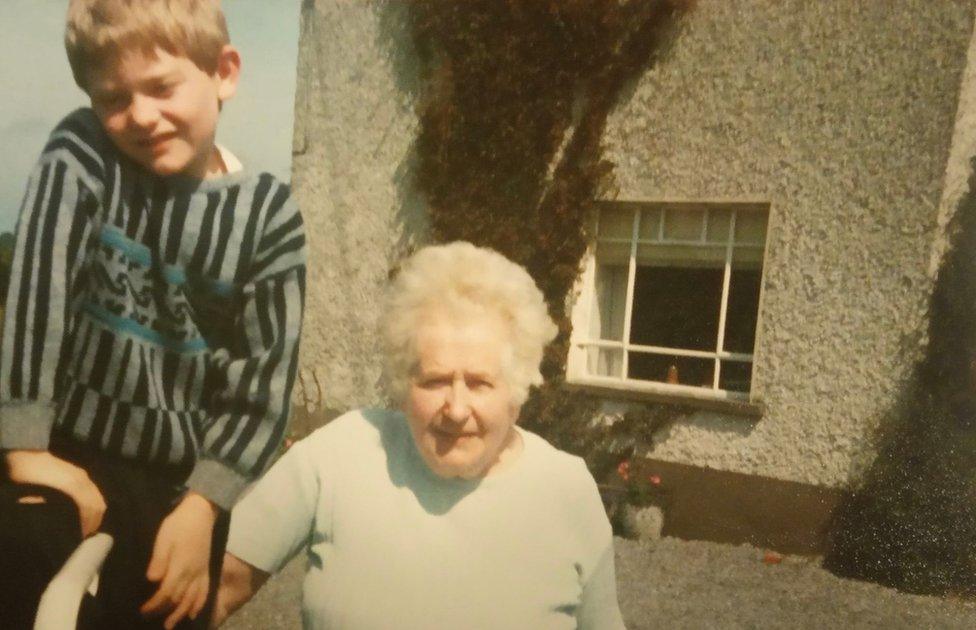
A young Morgan Fagg pictured with his late grandmother Una Fagg
Outside of his paramilitary activities, he led an unremarkable life as the manager of an agricultural store in County Westmeath and secretary of his local creamery committee.
Morgan Fagg said his grandfather was "well respected" as a businessman whose networking skills "made him a natural host for the secretive meeting in December 1969".
On his death in 1988, he was given a republican funeral with a eulogy from Ruairí Ó Brádaigh, external, founder of Republican Sinn Féin and believed to be a former leader of the IRA.
Morgan Fagg said Victor and Una Fagg are buried "in the Catholic side of Cornamagh Cemetery" just a short distance from his Victor's parents, who were laid to rest in the Protestant area of the same graveyard.
Although he is now "fascinated" by his grandfather's secretive past, Morgan Fagg has not changed his opinion on religious or armed conflict.
Speaking on Wednesday, the anniversary of 9/11, he said: "We all remember that 18 years ago, 2,900-plus people died in a terrorist attack.
"But more people died in the last 50 years in Ireland... and any conflict that we see taking place is not the answer.
"Fifty years on from the start of the Troubles, it's disturbing to think that we could ever go back to a border in Ireland or hatred on both sides."
The first episode of Spotlight on the Troubles: A Secret History is available now on the BBC iPlayer.
- Published6 September 2019
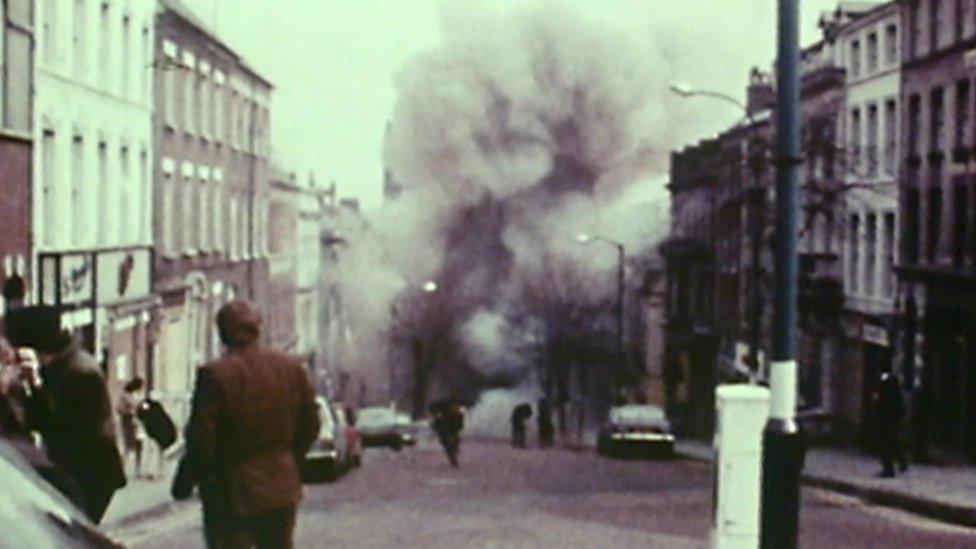
- Published6 September 2019
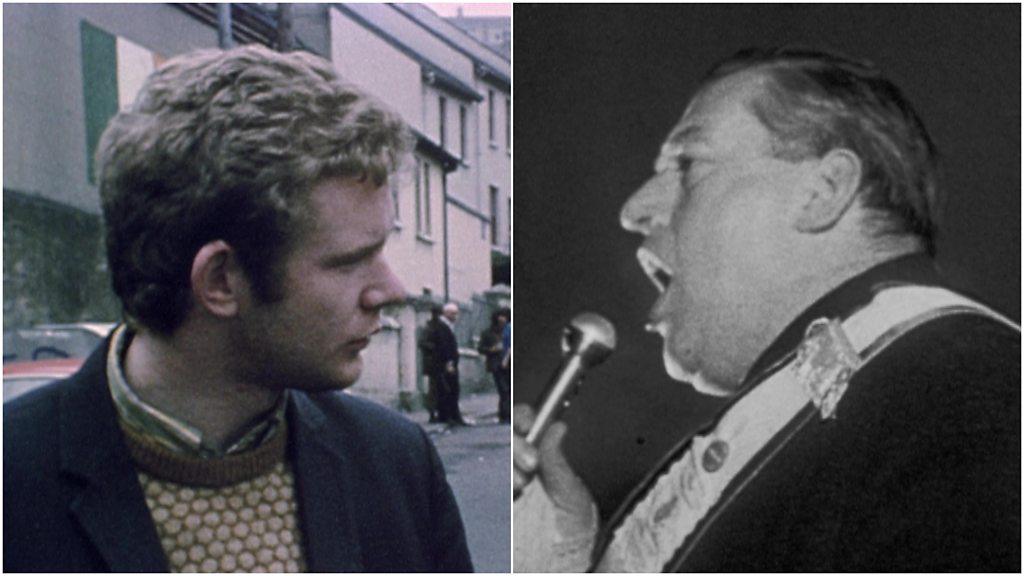
- Published12 August 2019
